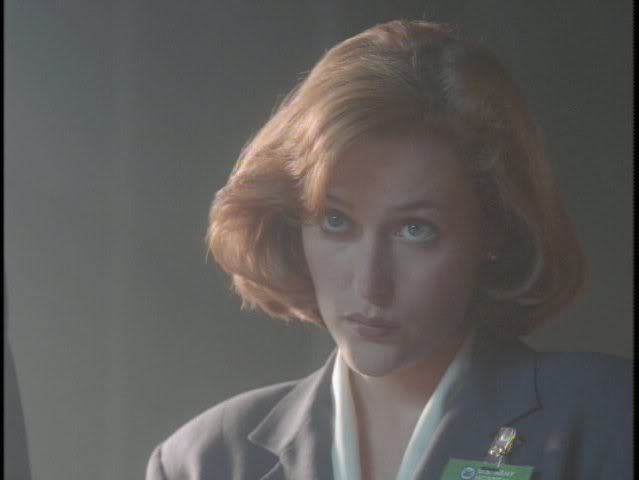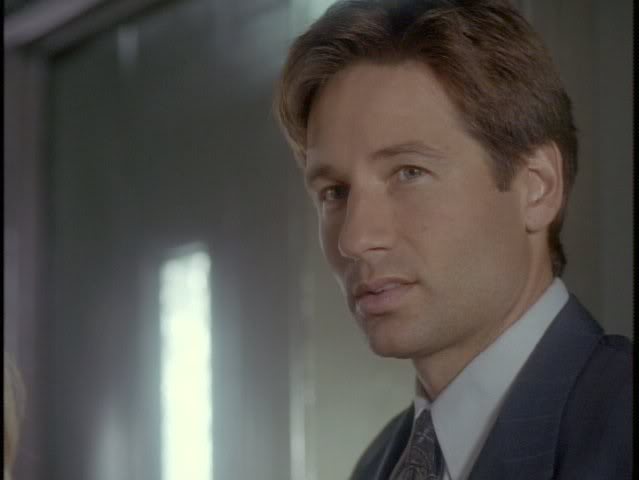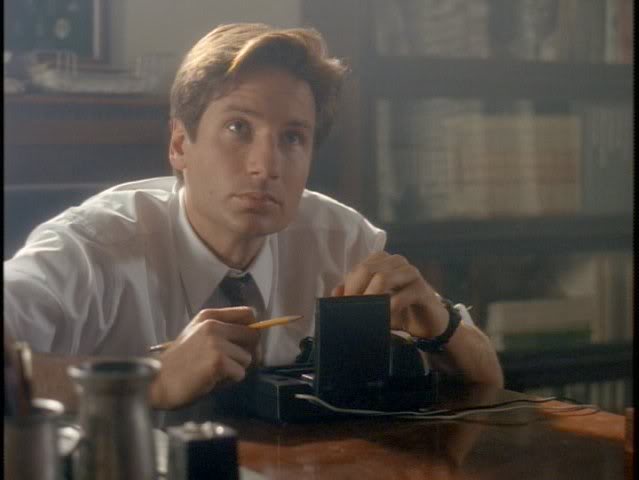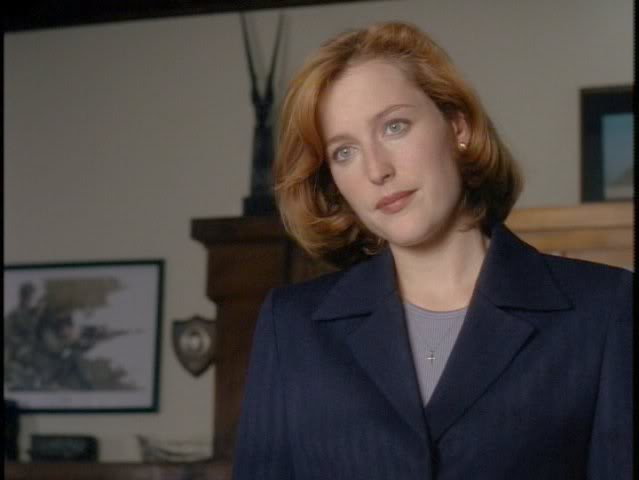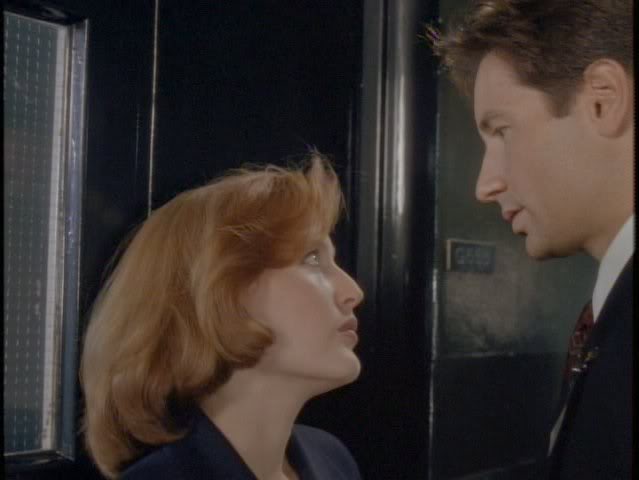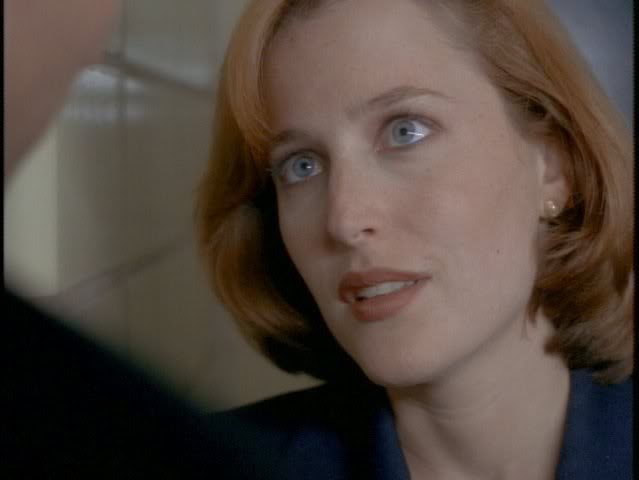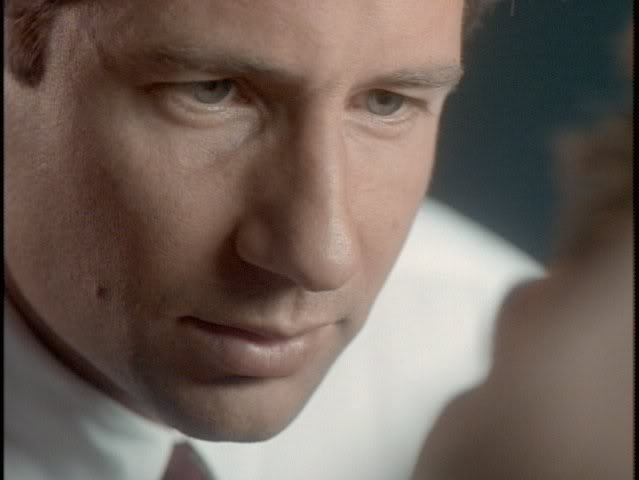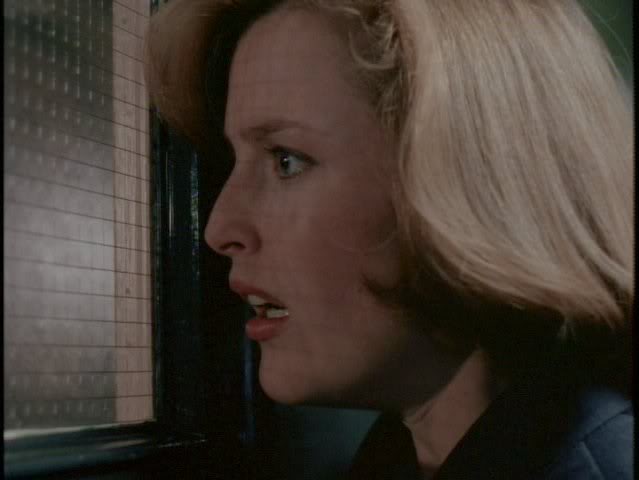CTP Episode of the Day - 11.02.06 - The Walk
Today's Cherished Episode: The Walk (3x07)
Original Air Date: November 10, 1995
Written By: John Shiban
Directed By: Rob BowmanA suicide attempt and subsequent murders at a military hospital bring Mulder and Scully into contact with a quadruple amputee veteran who may have the power of astral projection.
"Sometimes the only sane response to an insane world is insanity."
Some "The Walk" Tidbits & Musings:
-- The episode title comes from a line in the episode said by one of the disabled men in Rappo's therapy group: "I keep having the same dream almost every night. I know a lot of crips have the same dream. 'The Walk.' In my dream, I rise up out of my chair, and I can stand. I look down the hallway, I'm not in the ward anymore, I'm home. With my baby girl."
-- "The Walk" was John Shiban's first writing effort for The X-Files. After joining the writing staff, he worked his way up the 1013 corporate ladder to became a story editor, co-producer, producer, supervising producer, co-executive producer, and finally executive producer.
-- Shiban got the idea for this episode while watching an old Marlon Brando movie, The Men. "It just popped into my head that the strongest emotion for this guy was just to get up and walk -- that's the one thing he can't do, and the one thing he wants the most," he explained. "The astral projection thing just kind of fit. Then came the research."
-- Brando made his film debut in The Men (1950), a finely acted drama in which he portrayed an ex-G.I. who was seriously wounded during World War II. As a result of his injuries, the crippled soldier became increasingly bitter, and almost lost his will to live. Teresa Wright played Brando's girlfriend and Jack Webb played another paralyzed patient. To add realism to the film, it featured 49 men from the Birmingham Veterans Administration Hospital and footage of the water polo and wheelchair basketball team members shot at the first public games of the Paralyzed Veterans Association. To accustom himself to his role as a paraplegic, Brando remained in a wheelchair on and off the set for the duration of the shoot. He reluctantly made an exception to this "method" in order to attend a Hollywood party where he wanted to meet Charlie Chaplin. His date, Shelly Winters, through whom he had access to the party, insisted he come dressed nicely and sans wheelchair or not come at all.
-- Whether intentional or not, the episode aired on the eve of the Veterans Day Holiday, 1995. Veterans Day (formerly known as Armistice Day) is celebrated at 11 a.m. on the 11th day of the 11th month of the year (November 11) to celebrate the signing of the Armistice by the Allies and the Germans in 1918, ending World War I after four years of conflict.
-- "Ask any writer on the show," said Shiban, "and I guarantee they'll say the hardest scene in the story [to write] is Mulder and Scully's first scene in Act One because that's where they have to come together on the case, yet they have to be at odds. She has a scientific point of view, he has a paranormal point of view. It's a very difficult thing to do. It's deceptively simple when you see it and it works very well, but that was my big challenge when I started on the show, and it was still hard right up to the end."
-- The special effects department rigged the shot where the general's assistant drowned in the pool by securing a cable to the bottom that pulled the actress down. Mat Beck (visual effects supervisor) and David Gauthier (special effects supervisor) also teamed up to create the image of a wave launching over the woman as she clung to the side of the pool. "Mat and I seemed to work relatively closely," Gauthier said. "I got an idea of what he could do, and he got an idea of what I could do."
-- One of the crew members was completely buried in sand and then had to burst out of the ground in the scene where the boy got killed, with Beck optically enhancing the effect after the fact.
-- Shiban admitted there was some concern about killing the general's young son, though "it didn't bother me," he added with a laugh. "There were certain people on the staff who felt that was extreme, who didn't want to see that. I felt the whole idea behind the story was one of empathy -- this guy wanted his CO to feel how he felt: 'You took my whole life away. I've got nothing.' The only way to do that was to take everything away from the man, and what worse thing to lose than a child? It's horrific, but to me, that's what a horror story is about."
-- The general's young son was named "Trevor," most likely named after Shiban's nephew Trevor Marquiss, whom the character and episode "Trevor" (also written by Shiban) was named for. One of the boys in "Badlaa" (also written by Shiban) was also named Trevor.
-- The sequences where Rappo tossed Mulder and the general across the room utilized a device called an Air-Ram, which employed compressed air and when triggered created the effect of someone being catapulted.
-- Beck remembered running into another last-minute buzzsaw on the episode in terms of accomplishing the visual effects in time. "It was Wednesday at ten o'clock [at night], and we had a computer-generated man that did not look good," he chuckled, as technicians worked through the night to correct the image.
-- The facial shield worn by Colonel Stans was actually used for burn patients to protect the delicate subdermal layer of skin exposed by burns. Patients that badly burned lose the protection of their own skin and can become prey to any passing bacterium or virus.
-- Actor Ian Tracey was not a quadruple amputee; in reality, his arms and legs were hidden by clever costuming and placement, while makeup artist Toby Lindala added prosthetics to give him "stumps." The same effect was used in Season 5's "Kill Switch" to make Mulder a double amputee.
-- In "The Walk," General Callahan's mysterious caller used "backmasking" (also incorrectly known as "backwards masking"). Backmasking is an audio technique in which sounds are recorded backwards onto a track that is meant to be played forwards. Backmasking is a deliberate process, whereas a backward message (or backwards masking) may be unintentional or coincidental. Backmasking has been the source of much controversy, especially related to supposed secret or subliminal messages in rock music.
-- The practice of manipulating recorded music began in the late 1940s and 1950s with the advent of musique concrete. This avant-garde form of electronic music involved editing together fragments of natural and industrial sounds. The Beatles, who incorporated the techniques of concrete into their recordings, were responsible for popularizing the concept of backmasking. John Lennon, while under the influence of cannabis, played the tapes for "Tomorrow Never Knows," a song from Revolver, in reverse. Lennon enjoyed the sound of the song being played backwards, and shared the results with the other Beatles the following day. He then wrote "Rain," intending the song to be recorded entirely backwards; but producer George Martin (who claims he discovered the backwards effect) rejected this, and only the final verse was played backwards.
-- In the fall of 1969, Detroit-area D.J. Russell Gibb received a phone call from an anonymous caller that initiated the infamous "Paul is Dead" urban legend (a rumor that Beatle Paul McCartney had died) by playing certain Beatles records backwards to reveal hidden messages. One album in particular, The Beatles (often called The White Album) was said to contain backwards messages. Another well-known example of alleged backmasking is found in rock group Led Zeppelin's 1971 song "Stairway to Heaven." If a portion of the song is played backwards, then supposedly words beginning with "Here's to my sweet Satan" can be heard. But Swan Song Records issued the statement, "Our turntables only play in one direction -- forwards"; and Led Zeppelin vocalist Robert Plant denied the accusations in an interview: "To me, it's very sad, because 'Stairway to Heaven' was written with every best intention, and as far as reversing tapes and putting messages on the end, that's not my idea of making music."
-- Oopsie. General Callahan told Mulder that the man he saw in his office said his name, but all he said was "Your time has come, Killer".
-- Mulder speculated that the quadraplegic who lost both arms and legs in the Gulf War had somehow learned to project his spirit out of his body, a process sometimes called astral projection. Astral projection (or astral travel) is an interpretation of out-of-body experiences achieved either awake or via lucid dreaming, deep meditation, or use of psychtropics. Proponents of astral projection maintain that their conscious or soul has transferred into an astral body (or "double") which moves en tandem with the physical body in a parallel world known as the astral plane. The concept of astral projection has been around for thousands of years, dating back to ancient China. There are two general schools of thought on the nature of astral projection, broadly defined as the "mystical" model and the "phasing" model.
-- The "mystical" model includes a large variety of belief systems and astral maps, but they are tied together by their belief that astral projection takes place outside of the actual physical body. The "phasing" model, which was defined by Robert Monroe, contains the belief that it is impossible to actually leave the body in the truest sense of the word, and that the astral planes and the physical world are merely points on the long spectrum of consciousness. When a person projects, they actually "phase" into another area of consciousness and the locales it contains. This can be likened to tuning a radio to another station.
-- The closed caption version of Mulder's voiceover at the end of the episode was slightly different than the version that was actually heard during the episode. For example, this sentence appeared in the closed captioning but was not heard in the episode at all: "The Army Board of Inquiry declined to press charges against Lt. Col. Victor Stans after a lengthy investigation. Stans was released from the hospital and posted under medical supervision at Ft. Evanston."
-- The episode's final lines of voiceover were also different from the closed caption version. The closed caption version went like this: "Leonard Trimble was a casualty of the Gulf War. A victim of friendly fire. The wounds of war, however, can go beyond the physical and mental injuries of battle. There was a spiritual toll on the combatants, the attack against the psyche that leaves in its wake only bitterness and anger. It was war that destroyed Leonard Trimble's body and released his phantom soul. And it was war that destroyed those parts of himself that make us civilized human beings ... those better angels of our nature." The version that was heard in the final episode was much softer and went like this: "It was war that destroyed Leonard Trimble's body ... but his wounds went deeper than the loss of his limbs. What destroyed those parts of him that make us human beings? Those better angels of our nature? I cannot say."
-- Both versions of Mulder's voiceover include the words "those better angels of our nature." Those were the final words in Abraham Lincoln's first inaugural address, which ended with a message to the Secessionists whom Lincoln would soon oppose in the bloodiest war in America's history:
"In your hands, my dissatisfied fellow-countrymen, and not in mine, is the momentous issue of civil war. The Government will not assail you. You can have no conflict without being yourselves the aggressors. You have no oath registered in heaven to destroy the Government, while I shall have the most solemn one to 'preserve, protect, and defend' it. I am loath to close. We are not enemies, but friends. We must not be enemies. Though passion may have strained, it must not break our bonds of affection. The mystic chords of memory, stretching from every battlefield and patriot grave to every living heart and hearthstone all over this broad land will yet swell the chorus of the Union, when again touched, as surely they will be, by the better angels of our nature."
Lincoln was suggesting these "better angels of our nature" were humaneness, compassion, good will, tolerance, and other good things -- as Mulder suggests, "the things that make us human beings."
-- "The Better Angels of Our Nature" was the title of the ninth and final episode of Ken Burns' acclaimed miniseries The Civil War, which chronicled the aftermath of the War.
-- Willie Garson (Quinton "Roach" Freely) has been acting since the mid 1980's, after attending Yale Drama School. He has appeared in well-known films (including Groundhog Day, The Rock, Being John Malkovich, Freaky Friday (2003 version), and Fever Pitch). He had recurring roles on several TV series including Mr. Belvedere and NYPD Blue. He is probably best known for his recurring role as Stanford Blatch in Sex and the City,a role he enjoyed immensely as he has been friends with Sarah Jessica Parker for more than 15 years
-- Willie Garson has the odd distinction of having played JFK assassin Lee Harvey Oswald in three different, completely unrelated productions: Quantum Leap, Mad TV, and 1992's Ruby, which also featured a young David Duchovny. Garson guest starred on an episode of Twin Peaks in which David Duchovny did not appear, but the episode did have an indirect Duchvony connection -- it was directed by Stephen Gyllenhaal (father of actors Jake and Maggie Gyllenhaal; Maggie appeared in Trust the Man with DD). Garson returned to the X-Files as Henry Weems in Season 7's "The Goldberg Variation"; and appeared as a ticket agent in David Duchovny's 2004 film House of D.
-- Since his X-Files appearance, Thomas Kopache (General Thomas Callahan) has had recurring roles on The West Wing (as Assistant Secretary of State Bob Slatterly) and on Close to Home (as Trial Judge Salter). Additionally, Kopache is one of only a handful of actors to have appeared on all of the "new" Star Trek series. He played two minor characters on Star Trek: The Next Generation, recurring character Kira Taban on Star Trek: Deep Space 9, and the character Viorsa on a single episode of Star Trek: Voyager. His time on Enterprise included the characters Tos and The Alien. He also had a bit part as a Communications Officer in the Star Trek: Generations movie.
-- Ian Tracey (Leonard "Rappo" Trimble) went on to play Detective Mick Leary in the long-running Canadian TV series Da Vinci's Inquest and Coroner Mick Leary in its sequel Da Vinci's City Hall. He also played Daniel Armand in The 4400.
-- Once & Future Retreads: In addition to Willie Garson, Don Thompson (Lt. Col. Victor Stans) was Holtzman in "Conduit," Henry Willig in "Sleepless," and the Terrorist in the Ghoul Mask in "The Pine Bluff Variant." Deryl Hayes (Army Doctor) was Webster in "Shadows" and Agent Morris in "Little Green Men." Beatrice Zeilanger (Burly Nurse) was a Paramedic in "End Game." Pat Bermel (The Therapist) was Frank Ranford in "Tooms." D. Harlan Cutshall (The Guard) was the Adjutant in "Unrequited."
(Thanks to chrisnu for today's pics.)
Please share your first impressions, favorite (or cringe-worthy) moments, classic lines, favorite fanfic, nagging questions, repeated viewing observations, etc., as today we celebrate "The Walk."
Polly
